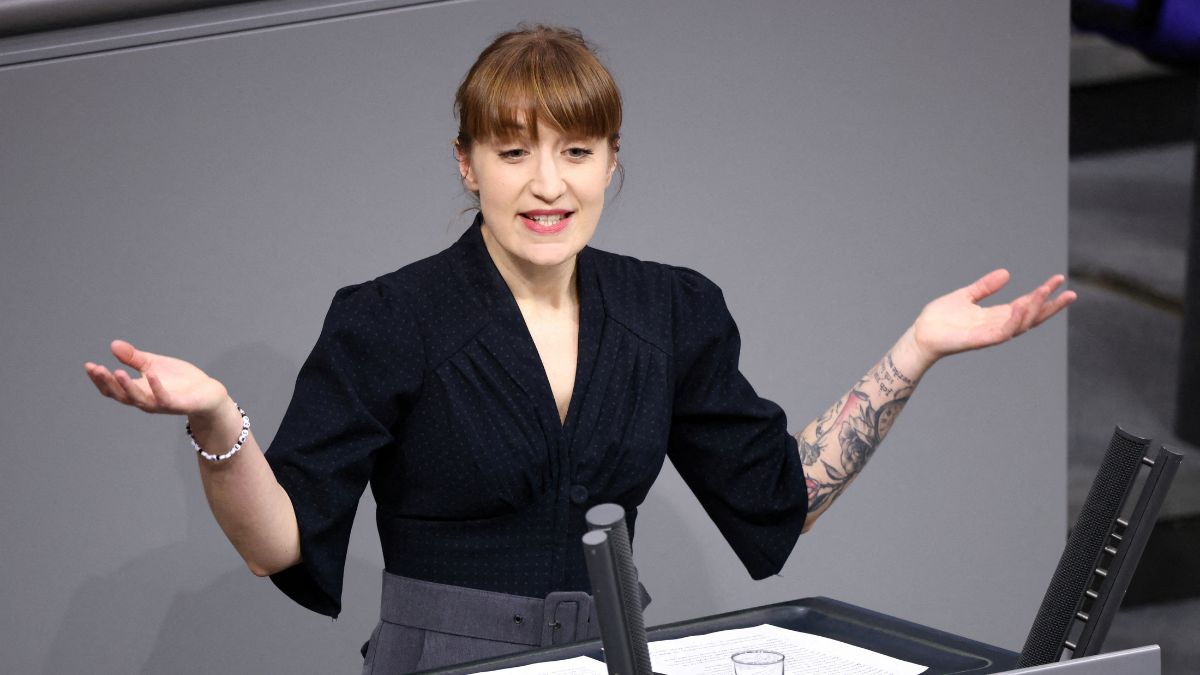Heidi Reichinnek, the 36-year-old tattoo-sleeved politician, is making waves in German politics as the leader of Die Linke (The Left), a hard-left party that has seen a sudden surge in popularity just ahead of Germany’s federal elections.
Once struggling at around 3-4 per cent in the polls and facing potential political irrelevance, the party has now gained traction, with some surveys placing it at 9 per cent, a significant leap that puts it in direct competition with the Greens and the Social Democrats (SPD).
Die Linke, which traces its roots to East Germany’s former communist party, has found a renewed purpose by focusing on the cost-of-living crisis while other parties debate economic recovery plans.
The party has also capitalised on the intense debate surrounding the normalisation of the far-right Alternative für Deutschland (AfD), a move that has polarised the German electorate.
How Heidi Reichinnek became ‘viral’
At the heart of Die Linke’s resurgence is Heidi Reichinnek, a charismatic figure known for her no-nonsense attitude and fiery speeches. A turning point came in late January when the Christian Democratic Union (CDU), under the leadership of Friedrich Merz, backed a resolution on illegal migration with support from the AfD.
This move shattered a long-standing political taboo in Germany, where mainstream parties have traditionally isolated the far-right.
Reichinnek seized the moment with a passionate speech in the Bundestag, condemning the CDU for lending legitimacy to the AfD. “You’ve made yourself an accomplice, and today you’ve changed this country for the worse,” she declared, accusing the conservatives of paving the way for a resurgence of fascism.
She urged citizens to “resist fascism in this country. To the barricades.”
The speech resonated across Germany, amassing over 30 million views on social media. Reichinnek’s rapid-fire delivery, coupled with her outspoken stance, transformed her into an overnight sensation, earning her the moniker “Queen of TikTok.”
Her social media following skyrocketed to a million users, making her one of the most recognisable faces of the election campaign.
How Die Linke has gained momentum
The newfound momentum for Die Linke is not just a result of Reichinnek’s viral moment; it also stems from the party’s strategic pivot toward young voters.
A recent study of 150,000 under-18s found that Die Linke ranked as the most popular party among Germany’s youth, a demographic that has become increasingly disillusioned with mainstream political options.
Die Linke’s campaign has placed a strong emphasis on addressing economic inequality. Its manifesto includes radical proposals such as nationalising private housing without compensation, legalising all drugs, doubling unemployment benefits, and imposing stricter regulations on rent prices.
Additionally, the party has championed progressive social policies, advocating for artificial insemination access for all genders and the formation of “queer trade unions.”
The economic message appears to be striking a chord. While the larger left-wing parties, such as the SPD and the Greens, focus on economic revival, Die Linke is speaking directly to those affected by high inflation and soaring living costs.
The party’s online tools, such as a rent gouging calculator and a heating cost estimator, have further bolstered its appeal among working-class voters.
Die Linke’s resurgence comes after a period of internal strife and near collapse. Last year, the party suffered a major split when Sahra Wagenknecht, one of its most prominent figures, departed to form her own leftist-nationalist movement.
Wagenknecht’s new party initially gained traction, particularly with her criticism of NATO and her opposition to military aid for Ukraine. However, her movement’s popularity has since waned, and recent polling suggests it may not reach the 5 per cent threshold required to enter the Bundestag.
Reichinnek, once considered an ally of Wagenknecht, has since steered Die Linke toward a different trajectory, embracing gender-inclusive language and progressive policies that Wagenknecht dismissed as “woke politics.”
What this means for the election in Germany
The unexpected surge of Die Linke has introduced new dynamics into the upcoming election. While a left-wing coalition similar to France’s 2022 political alliance remains unlikely, the party’s gains could complicate the CDU’s path to forming a government.
With the SPD polling at around 16 per cent and the Greens at 13 per cent, left-leaning parties remain divided, reducing the likelihood of an outright progressive majority.
On the other hand, the rise of Die Linke increases the possibility that the CDU may be forced into an uneasy coalition with two left-leaning parties, an outcome Friedrich Merz has sought to avoid.
Meanwhile, tensions remain high as anti-AfD protests continue across the country, with some CDU offices being vandalised and a right-wing politician narrowly escaping harm after sabotage was attempted on his campaign bus.
Germany goes to polls on February 23.
With inputs from agencies


)

)
)
)
)
)
)
)
)



